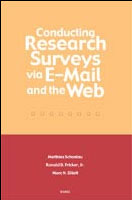
Title
Schonlau, M., Fricker, R. D. and Elliott, M. N. (2002) Conducting Research Surveys Via E-mail and the Web. Santa Monica. RAND.
Link
![]() http://www.rand.org/pubs/ monograph_reports/MR1480/
http://www.rand.org/pubs/ monograph_reports/MR1480/
Synopsis
Internet-based surveys, although still in their infancy, are becoming increasingly popular because they are believed to be faster, better, cheaper, and easier to conduct than surveys using more-traditional telephone or mail methods. Based on evidence in the literature and real-life case studies, this book examines the validity of those claims. The authors discuss the advantages and disadvantages of using e-mail and the Web to conduct research surveys, and also offer practical suggestions for designing and implementing Internet surveys most effectively. Among other findings, the authors determined that Internet surveys may be preferable to mail or telephone surveys when a list of e-mail addresses for the target population is available, thus eliminating the need for mail or phone invitations to potential respondents. Internet surveys also are well-suited for larger survey efforts and for some target populations that are difficult to reach by traditional survey methods. Web surveys are conducted more quickly than mail or phone surveys when respondents are contacted initially by e-mail, as is often the case when a representative panel of respondents has been assembled in advance. And, although surveys incur virtually no coding or data-entry costs because the data are captured electronically, the labor costs for design and programming can be high.

